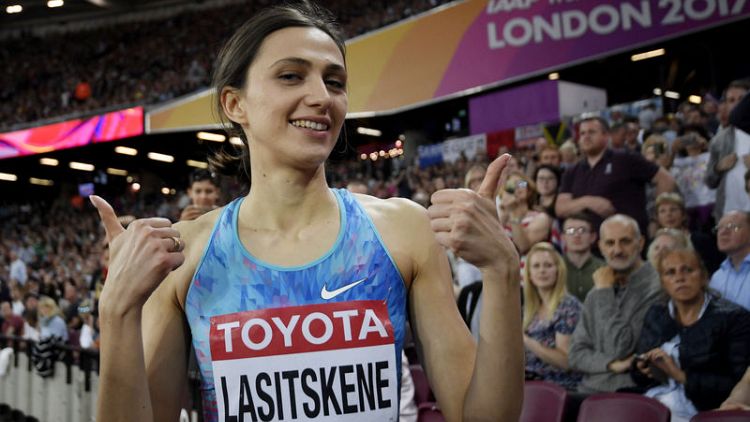By Gabrielle Tétrault-Farber
DOHA (Reuters) - Russian high jumper Maria Lasitskene is ready to leave Russia and train abroad for a chance to compete at the 2020 Tokyo Olympics as the country faces potential exclusion from the Games over alleged manipulation of anti-doping laboratory data.
The World Anti-Doping Agency (WADA) said this week it was looking to determine if the Russian anti-doping agency RUSADA was compliant with international anti-doping regulations after it found inconsistencies in Moscow's lab data.
If the agency was found to be non-compliant it could jeopardise the country's chances of being in Tokyo, with International Olympic Committee chief Thomas Bach saying a fresh look at Russia's participation might be needed.
"If that moment comes, then I would train abroad," twice world champion Lasitskene told reporters at the world championships on Friday. "It's possible that it will be necessary. I don't want to miss a second Olympics."
The 26-year-old, who stressed she did not plan to continue competing under another passport, was among the Russians barred from the 2016 Rio Olympics after a WADA-commissioned report revealed a state-backed doping programme across many sports.
Lasitskene has since been cleared by the IAAF, the governing body of global athletics, to compete internationally as a neutral after demonstrating she was competing in a doping-free environment. She won her 2017 world title as a neutral athlete.
"It's impossible to get used to it," she said of Russian athletes' neutral status. "It's unpleasant. We want to wear another uniform."
Lasitskene is one of the few Russian athletes critical of the country's athletics federation, which has been suspended since 2015 over evidence of state-sponsored doping in the sport.
Russian authorities have denied the existence of a state-sponsored doping programme but have accepted that senior officials were involved in providing banned substances to athletes and covering up positive tests.
The International Association of Athletics Federations (IAAF) earlier this week decided not to reinstate the Russian federation ahead of the world championships.
Reuters reported in June that two coaches and one doctor serving doping bans were still working with Russian athletes.
The IAAF Task Force overseeing the federation's reinstatement progress said coaches working with banned athletes called into question the federation's anti-doping efforts and hindered its reinstatement.
(Reporting by Gabrielle Tétrault-Farber; Editing by Ken Ferris)
